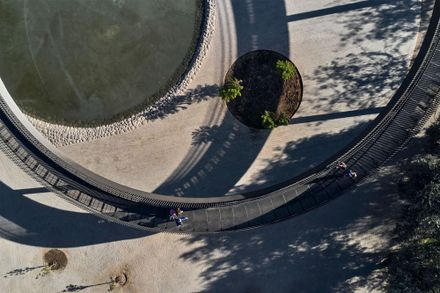
Cuauhtémoc Park Ramp
ARCHITECTS
Carreño Sartori Arquitectos
LEAD ARCHITECTS
Mario Carreño, Piera Sartori Del Campo
MANUFACTURERS
Canteras Andinas, Rgm, Renner Coatings
COLLABORATING ARCHITECTS
Paula Bugilio, Pablo Leiva, Blanca Barragán
CONSTRUCTION
Avo
LANDSCAPE
Piera Sartori De Campo
ELECTRICAL INSTALLATION
Pry
AREA
1200 M²
YEAR
2022
LOCATION
Vitacura, Chile
CATEGORY
Public Space
Rampa Cuauhtemoc. It is an open competition to solve the universal accessibility of a route that continues a system of public parks.
In the place, there is a bridge that crosses the highway and a circular pool from the 70s, a project by Carlos Martner, an outstanding Chilean landscape architect.
The growth of the avenue has compressed the original pedestrian descent and brought the cars closer to the park with great risk - and noise.
It is necessary to overcome 6 meters of unevenness with a constant slope of 5%, which requires an extension of 120 meters for the ramp. Taking advantage of the long circular perimeter of the pool, it is surrounded by a first 60-meter-long elevated walkway that descends with views of the surrounding mountains.
The second section - also 60 meters long - is a tree-lined slope, which serves as a containment for cars and noise. Between both sections, there is a staircase for quick passage and a small amphitheater.
Construction, Modulation, disassembly, and assembly. The torsion of the ascending spiral is resolved in a concentric digital model formed by radial ribs and a central beam, understood as a set of solidary elements.
This model unfolds into flat figures of the different pieces, which are cut with CNC on large format sheets of 3000x9000 mm.
In turn, these elements - which include semi-cuts for welded joints - are rolled for curvatures and assembled in the factory in nine equal modules plus three adjustment modules for the ends.Then, these prefabricated components are mounted on the in-situ pillars.
The shims, both for the terrain slopes and for the construction elements, were tested in different physical scale models, which anticipated the work.

















